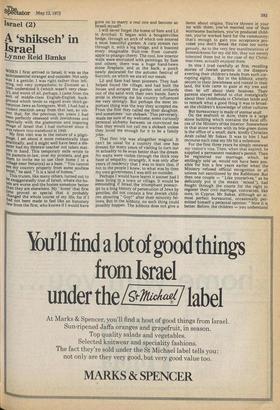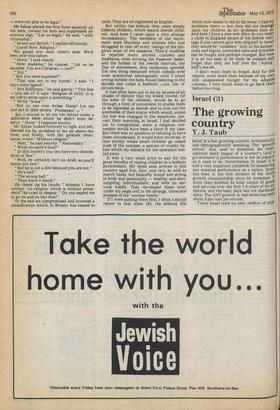I s ra e l ( 2 )
A `shikseh' in Israel
Lynne Reid Banks
WHEN I first arrived in Israel, it was as the quintessential stranger and outsider. Not only Was I a gentile; I was right rather than leftWing, not very sympathetic to Zionism as I then understood it (which wasn't very clearIY), and worst of all, perhaps, I came from the sort of middle-class English-English background which tends to regard even third-generation Jews as foreigners. Well, I had had a violent reaction away from that last, so violent that, for the previous ten years I had been perfectly obsessed with Jewishness and especially with the glamorous and inspiring image of Israel that I had nurtured since it Was reborn into statehood in 1948.
My first visit was in the nature of a pilgrimage. I set about it more romantically than Practically, and it might well have been a disaster had my Hebrew teacher not taken matters in hand. This temporary exile wrote to his parents-in-law, over my protests, and got them to invite me to use their home ( in a Village near Netanya) as a base. " You cannot 8,ee my country properly from some soulless notel," he said." It is a land of homes."
This truism, like many others, turned out to be exaggeratedly true of Israel, where the ho tels are worse and the homes somehow better than they are elsewhere. My ' home' that first
time proved so special that it probably changed the whole course of my life; for if I had not been made to feel like an honorary Jew from the first, who knows if I would have
gone on to marry a real one and become an Israeli myself?
I will never forget the home of Sam and Lil in Avichail. It began with a bougainvillea hedge, through an arch of which one entered a most beautiful garden. A carp stream ran through it, with a log bridge, and it boasted every imaginable fruit-tree from custardapple to pitango cherry. The cool, low interior walls were encrusted with paintings, by Sam and others; there was a huge hand-hewn stone fireplace, and at the back, a porch newly decorated for the autumn festival of Succoth, on which we ate all our meals.
Lil and Sam had been pioneers. They hadhelped found the village, and had built the house and scraped the garden and orchards out of the sand with their own hands. Sam's pride in showing me his country influenced me very strongly. But perhaps the most important thing was the way they accepted me. From the first they called me their daughter, and sometimes' our shihseh.' This perversely, made me sure of my welcome; some curiously personal alchemy between us convinced me that they would not call me a shihseh unless they loved me enough for it to be a family joke. That first trip was altogether magical. It can't be usual for a country that one has dreamt for many years of visiting to turn out in actuality to be even better than the dream. No warts were visible through the thick rosy haze of empathy; strangely, it was only after years of residency that I was to learn that, if not to the people I knew, to what was by then my own government I was still an outsider. Perhaps I would have learnt it sooner had I been living in a town or village. It would be astounding if Israel, the triumphant postscript to a long history of persecution of Jews by gentiles, did not contain a few Jewish children shouting "Goy" after their minority fellows. But in the kibbutz, no such thing could possibly happen. The kibbutz does not give a damn about origins. You've thrown in your lot with them, you've married one of their worrisome bachelors, you've produced child ren, you've worked hard for the community; that's enough to gain you acceptance pro vided you don't break the rules too outrageously. As to the very few manifestations of homesickness for my old life, they not merely • tolerated these but in the case of my Christmas trees, actualIV enjoyed them.
In this I trod carefully at first, recalling stories of Jewish parents in the diaspora averting their children's heads from such corrupting sights... But in the kibbutz, utterly secure in their Jewishness and rooted in their land, the kids came to gaze at my tree and then be off about their business. Their parents stayed behind to chat nostalgically about their childhoods in Christian lands and to remark what a good thing it was to broaden the children's knowledge of other cultures But bureaucracy is made of sterner stuff. On the seafront in Acre, there is a large stone building which contains the local offi ces of the Ministry of the Interior. Somewhere in that stone warren with its bile-green doors is the office of a small, dark, kindly Christian Arab called Mr Sakas. It was to him I had recourse each time my life hit a milestone.
For the first three years he simply renewed my visitor's visa. Then, when that expired, he supplied a permanent resident's permit. Then he registered our marriage, which, he smilingly told us, would not have been pos sible for him a few years earlier when the Ministry refused official recognition to all unions not sanctioned by the Rabbinate. But then one couple — " Like yourselves," as he delicately put it (he meant ' mixed '), had fought through the courts for the right to register their civil marriage, contracted, like ours, in Cyprus. Mr Sakas, although an almost perfect bureaucrat, occasionally per mitted himself a personal opinion: " Now it is better. Before, the children — you understand Mr Sakas placed the first form squarely on the desk, clicked his Ehro and suppressed an anxious sigh. "Let us begin," he said, "with citizenship."
"Israeli and British," I replied efficiently. "Good! Now. Religion."
We gazed into each other's eyes. We'd been over this before.
"None," I said clearly.
"Now madame," he coaxed. "Let us be sensible. You are Christian — not?"
" Not."
"But you were baptised?"
"That was not in my hands," I • said. "I have since lapsed."
" Mrs Stiffinson," he said gently. "This line you see it? It says ' Religion of child.' It is my job to write upon it something."
" Write ' None'."
"But no one ever writes 'None'! Let me just put in little letters, ' Protestant' — " But I refuced to let my son labour under a pejorative label which he didn't even deserve. " None," I repeated stonily. Mr Sakas looked furtively to right and left, chewed his lip, scribbled in the air above the form, and finally, with the greatest reluctance, wrote" Without religion."
"Next," he said heavily. " Nationality." "What on earth's that?"
"In this country you can have two choices. Arab or Jew."
"Well, he certainly isn't an Arab, so you'd better put Jew."
"But he is not a Jew because you are not." " He's half."
"The wrong half."
"Then leave it blank."
He threw up his hands. "Already I have written 'no religion' which is without precedent!" he cried in despair. " Do you expect me to go on and on like that?"
In the end we compromised and invented a classification which, in Britain, has ceased to exist. They are all registered as English.
But within the kibbutz they were simply kibbutz children, which means Jewish children. And here I came upon a very strange inconsistency. The members of our movement were Marxists and atheists who had struggled to cast off every vestige of the religious ways of the diaspora. They'd modified or rejected many ancient customs and traditions, even revising the Passover Seder, and the holiest of the Jewish festivals, the Day of Atonement, they studiously ignored. Yet one thing remained which nobody ever even questioned ideologically until I stood crying outside the baby-house listening to the shrieks and called it barbaric —the rite of circumcision.
It had often been put to me by Israelis of all shades of opinion that my wisest course, tor the sake of the children, would be to go through a form of conversion to enable them to be regarded as Jewish and to iron out the anomalies of their status which would, unless the law was changed in the meantime, prevent their marrying in Israel. I had decided not to compromise, since a religious conversion would have been a farce in my case. But there was no question of refusing to have them circumcised. It would have involved, in that society where small children go naked most of the summer, a species of cruelty before which my distaste for the operation melted away.
It was a very small price to pay for the great benefits of raising children in a kibbutz environment. My three sons arrived in this country aged five, four, and two, as wild as march hares, but basically sound and strong in body and personality — healthy and alert, outgoing, individualistic, and with no nervous habits. They developed these later, under my aegis and in the strange, unnatural stresses of the' nuclear family.' If I were putting them first, I think I should return to that other life, the kibbutz life,
which now seems to me so far away. I had my problems there — but they did not impinge upon my children as my problems here do. And here I have a new one: How do you make a child in England aware of his Jewish heritage if you cannot give him religion? In Israel they would be 'outsiders ' only to the bureaucrats and bigots, outmoded laws and attitudes can be fought and perhaps changed. But here it is all too easy to let them be insiders and, forget that they are half (not the 'wrong half!) Jewish.
I don't want them to forget. And for this reason, even more than because of my owh, still unappeased hunger for my adopted country. I very much want to go back there before too long.



































 Previous page
Previous page